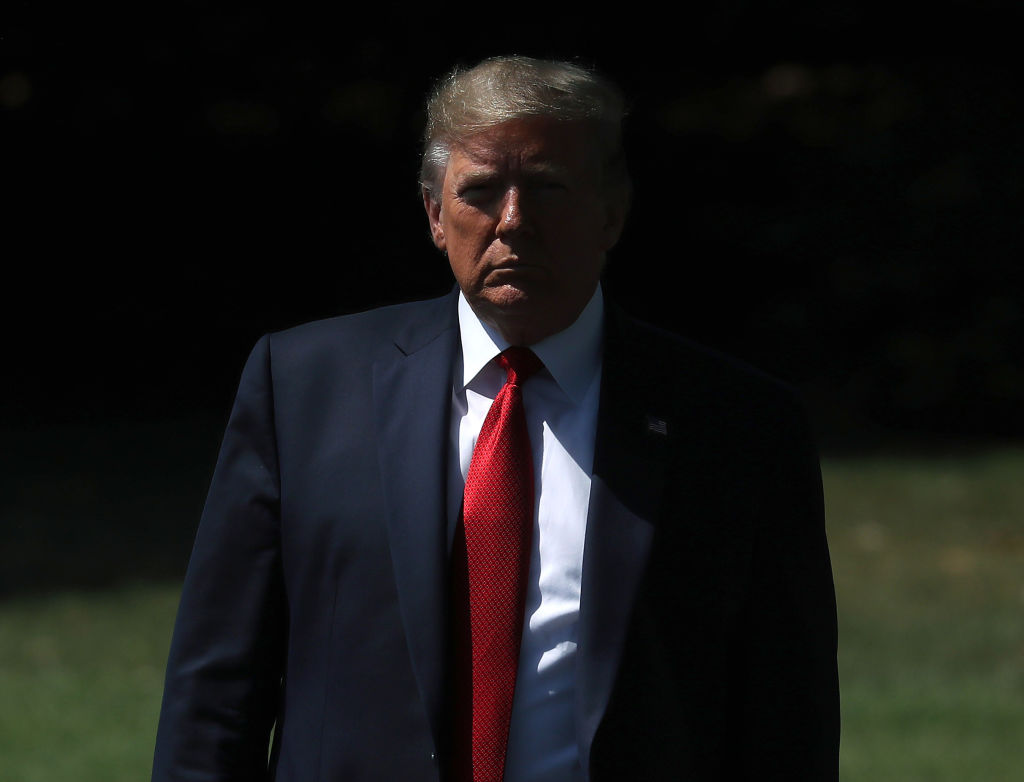Here's why Trump's 'disloyalty' comments repulsed American Jews


A free daily email with the biggest news stories of the day – and the best features from TheWeek.com
You are now subscribed
Your newsletter sign-up was successful
President Trump said a lot of things in his digressive 35-minute back-and-forth with reporters Wednesday afternoon, from the quixotically amusing — Federal Reserve Chairman Jay Powell raised interest rates "too fast, too furious" — to the messianic, mendacious, and undiplomatic.
Trump also elaborated on his statement Tuesday that "Jewish people that vote for a Democrat" show "either a total lack of knowledge or great disloyalty." Some of his Republican Jewish supporters had defended the comment, widely criticized by Jewish groups and Israeli politicians, saying Trump meant Jewish Democrats are disloyal to themselves, not Israel. On Wednesday, Trump clarified: "I think if you vote for a Democrat, you are very, very disloyal to Israel and to the Jewish people."

Trump comments flirted "with a notion that has fueled anti-Semitism for generations and has been at the root of some of the most brutal violence inflicted upon Jews in their history," Julie Hirschfeld Davis explains at The New York Times. "The accusation that Jews have a 'dual loyalty' ... dates back thousands of years. It animated the Nazis in 1930s Germany," and today "it is a common refrain of white supremacists who claim there is a secret plot orchestrated by Jews to replace white people through mass migration and racial integration."
The Week
Escape your echo chamber. Get the facts behind the news, plus analysis from multiple perspectives.

Sign up for The Week's Free Newsletters
From our morning news briefing to a weekly Good News Newsletter, get the best of The Week delivered directly to your inbox.
From our morning news briefing to a weekly Good News Newsletter, get the best of The Week delivered directly to your inbox.
Trump insisted his comments weren't anti-Semitic.

In fact, "when it comes to Jews, President Trump presents a puzzle," writes Yair Rosenberg at The Washington Post. "His daughter Ivanka converted to Judaism. ... He loudly proclaims his support for Israel and has long employed Jews in prominent positions in his businesses. But Trump also seems to say a lot of anti-Semitic things," including his frequent suggestion that "American Jews are more loyal to Israel than to the United States."
"So is Trump a philo-Semite or an anti-Semite? The answer is both," Rosenberg writes. "Trump believes all the anti-Semitic stereotypes about Jews. But he sees those traits as admirable. To Trump, the belief that Jews are foreign interlopers who use their wealth to serve their own clannish interests is not a negative — as it is for traditional anti-Semites — but rather a positive." Yes, "this form of 'positive' anti-Semitism is better than the negative kind," he adds, but "it is still deeply dangerous."
Read Rosenberg's essay on Trump's philo-Semitism at The Washington Post and a brief history of the "dual loyalty" slur at The New York Times.
A free daily email with the biggest news stories of the day – and the best features from TheWeek.com
Peter has worked as a news and culture writer and editor at The Week since the site's launch in 2008. He covers politics, world affairs, religion and cultural currents. His journalism career began as a copy editor at a financial newswire and has included editorial positions at The New York Times Magazine, Facts on File, and Oregon State University.
-
 The ‘ravenous’ demand for Cornish minerals
The ‘ravenous’ demand for Cornish mineralsUnder the Radar Growing need for critical minerals to power tech has intensified ‘appetite’ for lithium, which could be a ‘huge boon’ for local economy
-
 Why are election experts taking Trump’s midterm threats seriously?
Why are election experts taking Trump’s midterm threats seriously?IN THE SPOTLIGHT As the president muses about polling place deployments and a centralized electoral system aimed at one-party control, lawmakers are taking this administration at its word
-
 ‘Restaurateurs have become millionaires’
‘Restaurateurs have become millionaires’Instant Opinion Opinion, comment and editorials of the day
-
 NIH director Bhattacharya tapped as acting CDC head
NIH director Bhattacharya tapped as acting CDC headSpeed Read Jay Bhattacharya, a critic of the CDC’s Covid-19 response, will now lead the Centers for Disease Control and Prevention
-
 Witkoff and Kushner tackle Ukraine, Iran in Geneva
Witkoff and Kushner tackle Ukraine, Iran in GenevaSpeed Read Steve Witkoff and Jared Kushner held negotiations aimed at securing a nuclear deal with Iran and an end to Russia’s war in Ukraine
-
 Pentagon spokesperson forced out as DHS’s resigns
Pentagon spokesperson forced out as DHS’s resignsSpeed Read Senior military adviser Col. David Butler was fired by Pete Hegseth and Homeland Security spokesperson Tricia McLaughlin is resigning
-
 Judge orders Washington slavery exhibit restored
Judge orders Washington slavery exhibit restoredSpeed Read The Trump administration took down displays about slavery at the President’s House Site in Philadelphia
-
 Hyatt chair joins growing list of Epstein files losers
Hyatt chair joins growing list of Epstein files losersSpeed Read Thomas Pritzker stepped down as executive chair of the Hyatt Hotels Corporation over his ties with Jeffrey Epstein and Ghislaine Maxwell
-
 Judge blocks Hegseth from punishing Kelly over video
Judge blocks Hegseth from punishing Kelly over videoSpeed Read Defense Secretary Pete Hegseth pushed for the senator to be demoted over a video in which he reminds military officials they should refuse illegal orders
-
 Trump’s EPA kills legal basis for federal climate policy
Trump’s EPA kills legal basis for federal climate policySpeed Read The government’s authority to regulate several planet-warming pollutants has been repealed
-
 House votes to end Trump’s Canada tariffs
House votes to end Trump’s Canada tariffsSpeed Read Six Republicans joined with Democrats to repeal the president’s tariffs
